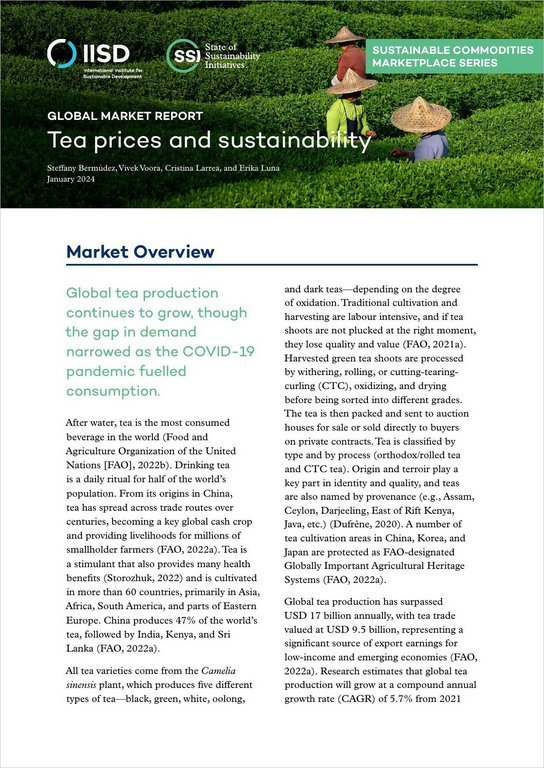- Share this article
- Subscribe to our newsletter
Tea prices and sustainability
There is an urgent need to develop new approaches for recognising the social and environmental costs of conventional tea production so that farmers can be adequately rewarded for using more sustainable practices, the Global Market Report: Tea prices and sustainability says. Published by the International Institute for Sustainable Development (IISD) in January 2024, it provides recommendations for how governments, private sector actors and standard-setting bodies can better support smallholder farmers and make tea production fairer and more sustainable.
Thirteen million people are employed in the global tea sector. Two thirds of them are smallholder farmers in developing countries, having produced 60 per cent of the world’s tea in 2022. They face the formidable challenge of producing an affordable, quality and more sustainable product in a highly competitive market and under increasingly harsh and unpredictable weather conditions.
In some tea-producing countries, smallholder farmers make no profit at all, as their total production costs can exceed their earnings, IISD writes. On top of bearing all the risks related to extreme weather changes and variations in the cost and availability of crucial inputs like fertilisers, they are also most affected by low prices and volatility in the tea sector.
Voluntary Sustainability Standards (VSSs) have been working to address sustainability challenges in the tea sector for 30 years. Many focus on building climate resilience, for example by encouraging farmers to use techniques that help them cope with periods of drought or that maintain soil fertility to improve yields and quality. Some also seek to improve the prices and incomes of smallholder farmers. The most prominent VSSs in the tea sector, ordered by 2019 production volumes, include Rainforest Alliance, Organic, Fairtrade and UTZ.
VSS-compliant tea now represents at least a quarter of total global production. However, evidence of VSSs’ impact on farmers’ incomes is limited and tends to be very context specific. It is not clear if minimum prices, premiums, and other differentials really make a difference to tea farmers’ livelihoods – or even make up for the costs of certification. They certainly will not if VSS-compliant tea is sold as conventional, which estimates suggest happens 90 per cent of the time, IISD points out.
(IISD/ile)
Read more and download the report on the IISD website





Add a comment
Be the First to Comment